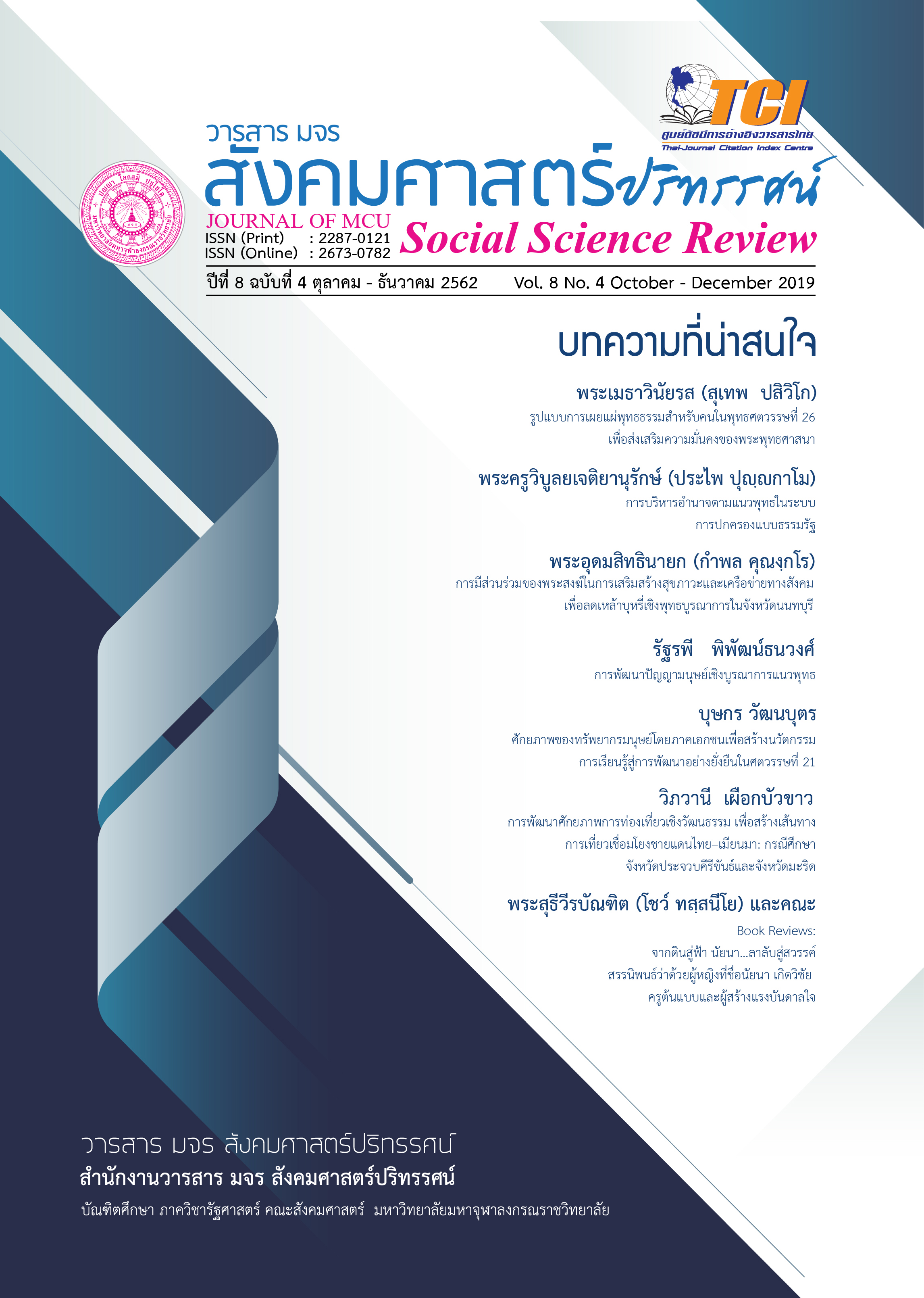รูปแบบการพัฒนาเศรษฐกิจ ตามหลักของปรัชญาเศรษฐกิจพอเพียงในอำเภอค้อวัง จังหวัดยโสธร
คำสำคัญ:
ความพอเพียง, มีเหตุผล, มีภูมิคุ้มกัน, ความรู้, คุณธรรมบทคัดย่อ
การวิจัยนี้เป็นวิจัยแบบผสมเชิงคุณภาพและเชิงปริมาณ วัตถุประสงค์ (1) เพื่อศึกษาพฤติกรรมในการดำเนินชีวิตตามหลักปรัชญาเศรษฐกิจพอเพียงของประชาชน อำเภอค้อวัง จังหวัดยโสธร (2) เพื่อศึกษาแนวทางการพัฒนาเศรษฐกิจตามหลักปรัชญาเศรษฐกิจพอเพียง และ (3) เพื่อหารูปแบบการพัฒนาที่ยั่งยืนตามหลักปรัชญาเศรษฐกิจพอเพียง ผู้ให้ข้อมูลเชิงคุณภาพ 20 คน กลุ่มตัวอย่างเชิงปริมาณ จำนวน 400 คน วิเคราะห์ข้อมูลเชิงปริมาณด้วยสถิติเชิงพรรณนา การวิเคราะห์ข้อมูลเชิงคุณภาพ ใช้การวิเคราะห์เชิงเนื้อหาที่ใช้ในการจัดกลุ่มของข้อมูล ผลการวิจัย (1) พฤติกรรมในการดำเนินชีวิตตามหลักปรัชญาเศรษฐกิจพอเพียงของประชาชน มีระดับการแสดงความคิดเห็นภาพรวมอยู่ในระดับมาก เมื่อแยกรายด้าน พบว่า ด้านอาหาร อยู่ในระดับมากที่สุด (2) แนวทางการพัฒนาเศรษฐกิจตามหลักปรัชญาเศรษฐกิจพอเพียงของประชาชน ประชาชนมีความรู้ ความเข้าใจถึงปรัชญาเศรษฐกิจพอเพียง และนโยบายของผู้นำ ได้แก่ (1) การกระทำกิจกรรมลงทุน (2) การใช้จ่าย (3) การจัดทำบัญชีครัวเรือน (4) การรู้จักแสวงหาความรู้ (5) การลงทุน (6) มีความซื่อสัตย์สุจริต (7) การรู้จักใช้เวลาว่างให้เกิดประโยชน์ (8) การกระทำกิจกรรมร่วมกัน (9) การรู้จักประหยัด และ (10) การรู้จักคิด วางแผน วิเคราะห์ (3) รูปแบบการพัฒนาที่ยั่งยืนตามหลักปรัชญาเศรษฐกิจพอเพียงของประชาชน ประชาชนควรมุ่งเน้นการทำเกษตรแบบพอเพียง โดยยึดหลักปรัชญาของเศรษฐกิจพอเพียง ยึดถือปราชญ์ชาวบ้านเป็นต้นแบบ มีศูนย์การเรียนรู้
เอกสารอ้างอิง
Chaiyawat Wibulswasdi, Priyanut Piboolsravut, Kobsak Pootrakool. (2012). Sufficiency Economy Philosophy and Development. Bangkok : Project to Support the “Sufficiency Economy”, Drive in Educational Institutions and to Young People, The Crown Property Bureau.
Chutinan Thongkhum. (2012). Factors Influence the Households Behavior of Living with the Philosophy of Sufficiency Economy in Nonsung District, Nakhon Ratchasima Province. (Master of Business Administration thesis). Faculty of Business Administration: Rajamangala University of Technology Isan.
Kanda Tekhanmag. (2009). Factors Related to Lifestyles of Sufficiency Economy Philosophy of Students of Phranakhon Si Ayutthaya Rajabhat University. Ayutthaya : Phranakhon Si Ayutthaya Rajabhat University.
Kanlaya Vanichbuncha. (2011). Statistics for Research Work. Bangkok : Department of Statistics, Faculty of Commerce and Accountancy, Chulalongkorn University.
Navarat Boonpila. (2017). Taking the Philosophy of Sufficiency Economy Applied to Develop the Community Economy for the Case of Ban Tonnalab, Moo 1, Tonnalab Sub-district, Ban Dung, Udon Thani Province. Mahachula Academic Journal. 4(2), 67-75.
Office of the Royal Development Project Board. (2004). Sufficiency Economy. Bangkok : Office of the Royal Development Project Board.
Phusit Khantikul. (2012). The Application of Sufficiency Economy Philosophy for Individuals and Families Level of Residences in Dusit District, Bangkok. Bangkok : Suan Sunandha Rajabhat University.
Prasopchoke Mongsawad and Niramonh Ariya-apakamol. (2014). Fifteen Years After the Crisis: Have We Been on the Sufficiency Economy Path?. NIDA Development Journal. 54(1), 77-105.
Rungkarn Yodkhong. (2013). The Study of Lifestyle Behavior Based on the Sufficiency Economy Philosophy of the Students at Siam Business Administration Nonthaburi Technological College (SBAC). Nonthaburi : Siam Business Administration Nonthaburi Technological College.
Siribuppa U-tantada and others. (2016). Sufficiency economy and sustainability. Journal of Thai Interdisciplinary Research. 84-94.
Sirinard Buasorn. (2016). A Model for Self-Sufficiency Economy Development of Khumnuea Village, Huachang Sub-District, Juturapakpimarn District, Roi Et Province. A Dissertation for the (Doctor of Doctor of Philosophy thesis). Graduate Studies: Rajabhat Maha Sarakham University.
Sucheera Tanavut. (2016). The Study of Procedures, Models, and Methods of Implementing Sufficiency Economy Philosophy in Actual Business Development. (Doctor of Doctor of Philosophy thesis). Graduate School of Commerce: Burapha University.
Thawatchai Peangpinit and Teerasak Lamom. (2011). The Propulsion Development Model of the Sufficiency Economy Philosophy of the Folk Philosophers and Multilateral Isan Region. Bangkok : N.P.
Trang Community Development Office. (2017). The Development of Sufficiency Economy Village By Department of Community Development. Retrieved May 21, 2018, from https://trang.cdd.go.th/services/Economic Village Development on May 21, 2018.
Visutta Chusriwart. (2016). Operation of the Sufficiency Economy Village, Hua Ao, Bang Chang Sub-District, Sam Phran, Nakhon Pathom Province. Bangkok : Rajapruk University.
Yamane, Taro. (1973). Statistics: An Introductory Analysis. Third Edition. New York : Harper and Row Publication.
ดาวน์โหลด
เผยแพร่แล้ว
รูปแบบการอ้างอิง
ฉบับ
ประเภทบทความ
สัญญาอนุญาต
ลิขสิทธิ์ (c) 2019 วารสาร มจร สังคมศาสตร์ปริทรรศน์

อนุญาตภายใต้เงื่อนไข Creative Commons Attribution-NonCommercial-NoDerivatives 4.0 International License.
เพื่อให้เป็นไปตามกฎหมายลิขสิทธิ์ ผู้นิพนธ์ทุกท่านต้องลงลายมือชื่อในแบบฟอร์มใบมอบลิขสิทธิ์บทความให้แก่วารสารฯ พร้อมกับบทความต้นฉบับที่ได้แก้ไขครั้งสุดท้าย นอกจากนี้ ผู้นิพนธ์ทุกท่านต้องยืนยันว่าบทความต้นฉบับที่ส่งมาตีพิมพ์นั้น ได้ส่งมาตีพิมพ์เฉพาะในวารสาร มจร สังคมศาสตร์ปริทรรศน์ เพียงแห่งเดียวเท่านั้น หากมีการใช้ภาพหรือตารางหรือเนื้อหาอื่นๆ ของผู้นิพนธ์อื่นที่ปรากฏในสิ่งตีพิมพ์อื่นมาแล้ว ผู้นิพนธ์ต้องขออนุญาตเจ้าของลิขสิทธิ์ก่อน พร้อมทั้งแสดงหนังสือที่ได้รับการยินยอมต่อบรรณาธิการ ก่อนที่บทความจะได้รับการตีพิมพ์ หากไม่เป็นไปตามข้อกำหนดเบื้องต้น ทางวารสารจะถอดบทความของท่านออกโดยไม่มีข้อยกเว้นใดๆ ทั้งสิ้น





